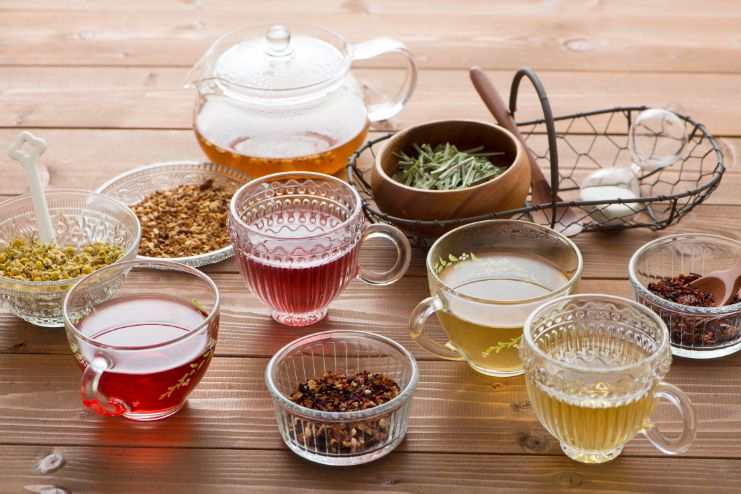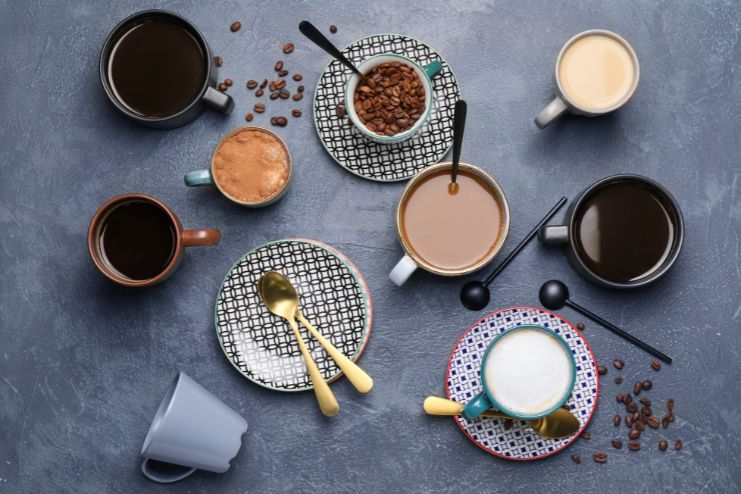Affiliate Disclaimer
Some links in this article are affiliate links. We may earn a small commission if you make a purchase through these links, at no extra cost to you. We only recommend products we find useful to our readersHave you ever wondered if daily coffee consumption could weaken your digestive system? While coffee is a popular choice, sometimes it results in stomach issues, such as acidity, bloating, reflux, and even IBS attacks.
For individuals with delicate digestion, excessive acidity and caffeine levels may irritate the stomach lining and disrupt the intestinal balance, thus causing discomfort. If you experience these issues but still require a pick-me-up, switching to gut-friendly alternatives may be the solution.
Fortunately, some natural beverages enhance digestion and provide sustained energy. For instance, although it contains inulin, a prebiotic fiber that feeds bacteria in the intestines, chicory root coffee tastes similar to regular coffee.
A great alternative is matcha tea, which provides sustained energy release without jitters. Prepared with turmeric and spices, golden milk contains anti-inflammatory agents that promote healthy digestion. Herbal teas like ginger and peppermint are soothing options designed to assist digestion and minimize bloating.
Exploring these alternatives will make your gut smile and help you maintain your energy levels. Let’s discover what option works best for your taste and lifestyle.
READ MORE: Coffee Vs. Tea: Which One Boosts Metabolism More?
Why Coffee Can Be Harsh on Your Gut

Although coffee is one of the favorite beverages, it has some complex effects on digestive health. While it gives people a boost of energy, some experience issues related to acidity due to the caffeine content, which can impact the gut microbiome.
A better way to maintain energy levels without worsening your stomach is to switch to coffee alternatives. Replace them with gut-friendly beverages if you have digestive issues due to coffee intake.
Acidic Nature
Coffee may irritate the stomach lining due to its natural acidity. This inflammation is associated with conditions such as gastritis and can cause discomfort. Coffee can also relax the muscle that prevents your stomach acids from going back into the esophagus, the lower esophageal sphincter.
For someone with a sensitive digestive system, this can cause heartburn and acid reflux, which is uncomfortable. Drinking low-acid beverages or herbal teas (gut-friendly drinks) may ease some of these issues.
Caffeine’s Impact
A key chemical found in coffee, caffeine, increases the production of stomach acid. For some, this can actually aid in digestion; however, excessive acid production can cause bloating, cramps, and/or acid reflux.
In addition, coffee causes muscles in the digestive tract to spasm, which can be painful for those with gastritis or IBS. If coffee makes you uncomfortable, trying matcha, golden milk, or chicory root coffee can help you find an energy boost that is milder and with less stomach discomfort.
Effect on Gut Microbiome
The gut microbiome has an impact on general health and digestion. Coffee contains chemicals known as “polyphenols” that can alter the gut microbiome.
A small amount of coffee may promote some beneficial bacteria, but excess coffee consumption may disrupt that balance, leading to stomach upset or pain. Switching to drinks that are gut-friendly and high in probiotics, such as kefir or kombucha, will help maintain a healthy gut environment.
Laxative Effect
Everyone understands that coffee can help you have a bowel movement because it promotes gastrointestinal motility. This can be helpful in the case of constipation, but some people might experience urgency or discomfort with this effect.
In contrast, hot or iced peppermint tea or warm lemon water can support digestion in a more gentle way than coffee. If coffee causes gut distress, provide your body with gut-friendly drinks and coffee alternatives to energize you without sacrificing gut health.
READ NEXT: Is Your Morning Coffee Sabotaging Your Gut Health?
Best Gut-Friendly Coffee Alternatives

For those looking to reduce their coffee intake without sacrificing flavor or energy, several low-acid coffee options and anti-inflammatory drinks can support digestion and overall well-being.
These beverages help maintain a balanced gut microbiome, providing natural energy without the harsh effects of caffeine.
Herbal Teas (Caffeine-Free & Gentle on the Stomach)
Herbal tea benefits include soothing the stomach, reducing inflammation, and promoting relaxation.
- Chamomile Tea– Known for its calming effects, chamomile helps reduce inflammation and supports digestion, making it ideal for sensitive stomachs.
- Peppermint Tea– A great choice for relieving bloating and improving digestion, peppermint tea relaxes the digestive tract.
- Ginger Tea– A powerful anti-inflammatory drink, ginger tea helps soothe the gut, reduce nausea, and improve digestion.
Low-Acid Coffee Alternatives
If you’re experiencing acid reflux or stomach discomfort from coffee, these low-acid coffee substitutes can be a great alternative:
- Chicory Root Coffee– A caffeine-free drink with a similar taste to coffee, chicory is also prebiotic-rich, supporting a healthy gut microbiome.
- Dandelion Root Tea– This earthy, coffee-like beverage aids in liver detox and supports digestion, making it a gut-friendly alternative.
Matcha & Green Tea (Lower Caffeine, Rich in Antioxidants)
When comparing matcha vs coffee, matcha provides a smoother energy boost with additional health benefits.
- Matcha– Unlike coffee, matcha contains L-theanine, which promotes sustained energy without the jitters. It also supports digestion and provides antioxidants.
- Green Tea– Milder than matcha, green tea aids digestion and is gentle on the stomach while still offering a small caffeine boost.
Golden Milk (Turmeric Latte)
A powerful anti-inflammatory drink, golden milk combines:
- Turmeric, ginger, and cinnamon help reduce inflammation and support digestive health.
- Plant-based milk, making it a creamy and gut-friendly option.
Bone Broth
Rich in collagen and amino acids, bone broth:
- Supports gut lining repair and overall digestive health.
- Provides natural hydration and sustained energy without caffeine.
Adaptogenic Drinks
Adaptogens help the body manage stress and provide natural energy without caffeine.
- Mushroom Coffee (Chaga, Reishi, Lion’s Mane)– These mushrooms support the gut microbiome while helping with stress and focus.
- Ashwagandha & Maca Root Blends– These adaptogens balance energy levels and reduce stress without relying on caffeine.
Probiotic & Fermented Drinks
Probiotics play a crucial role in maintaining a healthy gut microbiome.
- Kefir– A fermented dairy or non-dairy drink packed with probiotics, supporting digestion and gut health.
- Kombucha– A fizzy, fermented tea that offers natural energy and promotes healthy digestion.
By experimenting with these low-acid coffee and herbal tea benefits, you can find the best alternative that suits your taste and supports your digestive health.
READ MORE: Why Mushroom Coffee is Taking Over Wellness Trends?
How to Transition Away from Coffee Without Withdrawal

Reducing or eliminating coffee can be challenging, especially if you experience withdrawal symptoms like headaches, fatigue, or irritability. However, with the right approach, you can transition smoothly while maintaining caffeine-free energy and avoiding discomfort.
Gradual Reduction Strategies
Quitting coffee suddenly can lead to intense withdrawal symptoms. Instead, reduce your intake gradually. For example, if you drink four cups daily, cut down to three for a week, then two, and so on.
This slow reduction allows your body to adjust, making it easier to manage symptoms. If you have caffeine sensitivity, this method is even more important, as a sudden drop in caffeine levels can cause severe fatigue and mood swings.
Blending Alternatives with Coffee
Blending coffee alternatives with your regular cup is an effective way to transition. Start by mixing half regular coffee with half a caffeine-free substitute, such as chicory root coffee, matcha, or herbal tea.
Over time, the amount of the alternative should be increased while reducing coffee consumption. This gradual switch helps maintain your energy levels while lowering caffeine intake. People with caffeine sensitivity may find that herbal teas or golden milk provide a more stable and gentle energy boost.
Hydration Tips to Avoid Energy Crashes
Hydration plays a key role in maintaining caffeine-free energy. Dehydration can lead to fatigue, making you crave coffee for an energy boost. Drinking enough water throughout the day helps prevent energy crashes.
You can also include hydrating beverages like coconut water, infused water, or herbal teas to stay refreshed and energized. Proper hydration supports digestion and overall well-being, making the transition easier.
Whether you choose to cut back due to caffeine sensitivity or simply want a healthier routine, these steps will help you make the shift without discomfort.
READ NEXT: Why Coffee Makes You Tired?
Final Thoughts

Changing from coffee to a gut-friendly substitute is a personal path based on your taste preferences, energy needs, and goals for digestive health.
While some people could look for a drink that tastes like coffee, others might want a little energy boost without caffeine as the priority. Above all, take into consideration alternative options to help you find a more suitable beverage, whether it is matcha, herbal teas, or coffee made from roasted chicory root.
Testing out different options will help you figure out what works best for your individual approach to health and lifestyle. Maybe you would like to drink dandelion tea, which is caffeine-free and good for digestion because of its prebiotic properties. For an interesting choice that still has some coffee flavor with less caffeine, mushroom coffee blends could work as well.
Choose different drinks and pay attention to your physical responses. See what each of these alternatives does to your digestion, well-being, and energy levels. This kind of thinking will help you to choose a drink that tastes fabulous and works wonders for your health.
Remember, the goal is to pick a drink that caters to your needs in attaining wellness and pleasure.
References
- https://flore.com/blogs/learn/gut-friendly-coffee-alternatives
- https://globalhealing.com/blogs/education/coffee-alternatives
- https://continentalhospitals.com/blog/is-coffee-helping-or-harming-your-gut-bacteria/
- https://pmc.ncbi.nlm.nih.gov/articles/PMC8778943/
- https://allieddigestivehealth.com/can-coffee-cause-gastritis/
- https://www.baptisthealth.com/blog/health-and-wellness/how-to-manage-caffeine-withdrawal
- https://www.henryford.com/blog/2024/09/how-to-quit-caffeine-without-the-headache
- https://myhealthcareclinic.com/conditions/caffeine-withdrawal/
- https://www.webmd.com/diet/ss/slideshow-what-happens-when-you-give-up-caffeine
- https://www.theflowspace.com/lists/best-gut-friendly-coffee/
- https://www.health.com/coffee-alternatives-11690839
- https://www.health.harvard.edu/blog/energy-boosting-coffee-alternatives-what-to-know-202302222893
In this Article


















